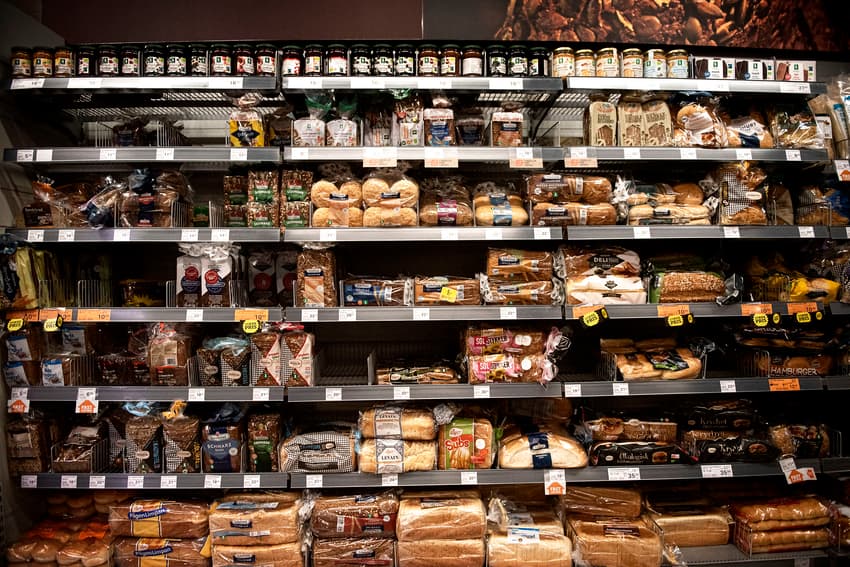Danish inflation continues upward trend in latest figures

Price levels in Denmark continued to rise in August, according to data released on Monday by official agency Statistics Denmark.
Last month saw prices 8.9 percent higher than they were 12 months prior, an increase on the inflation level of 8.7 percent measured in July, the agency said.
The figure also represents the highest 12-month increase in prices since 1983.
Broken down into product groups, categories central to household finances remain among those to have seen the steepest price hikes.
Food, electricity and gas provide the largest contributions to the inflation figure.
READ ALSO: How much will Danish energy bills go up this winter?
The price of food and non-alcoholic drinks was 15.9 percent higher in August than it was in August 2021.
Consumer economist Louise Aggerstrøm Hansen of Danske Bank noted that despite the latest inflation increases, prices had not risen as much month-to-month as they earlier this year.
However, food prices normally fall in August, she also noted. The price of milk, cheese and eggs remains around 25 percent above last year’s prices.
Future trends on the prices of consumer goods are becoming increasingly difficult to predict although additional inflation is likely, senior economist Jeppe Juul Borre of Arbejdernes Landsbank told news wire Ritzau in a comment.
“Energy prices are jumping and dancing and are currently helping define the direction of inflation,” he said.
“There is additional an outlook of broad price increases for Danes whereby many companies increase their prices in the near future,” he said.
An inflation level of 10 percent in the coming months is not out of the question, he said.
Hansen also said the situation was more likely to worsen before improving.
“Fundamentally, the inflation problem comes from consumers having too much to spend while there have been supply problems across the globe,” she said in a written comment to Ritzau.
“It is taking a long time to increase supply, so the cure for inflation is that we must get poorer. As we automatically will be when prices increases undermine our spending power, unless incomes also go up,” she said.
The European Central Bank last week increased its interest rate in an anti-inflation measure, with Denmark’s central Nationalbank following suit shorty afterwards.
READ ALSO: What does ‘historic’ interest rate hike mean for Denmark?
Comments
See Also
Last month saw prices 8.9 percent higher than they were 12 months prior, an increase on the inflation level of 8.7 percent measured in July, the agency said.
The figure also represents the highest 12-month increase in prices since 1983.
Broken down into product groups, categories central to household finances remain among those to have seen the steepest price hikes.
Food, electricity and gas provide the largest contributions to the inflation figure.
READ ALSO: How much will Danish energy bills go up this winter?
The price of food and non-alcoholic drinks was 15.9 percent higher in August than it was in August 2021.
Consumer economist Louise Aggerstrøm Hansen of Danske Bank noted that despite the latest inflation increases, prices had not risen as much month-to-month as they earlier this year.
However, food prices normally fall in August, she also noted. The price of milk, cheese and eggs remains around 25 percent above last year’s prices.
Future trends on the prices of consumer goods are becoming increasingly difficult to predict although additional inflation is likely, senior economist Jeppe Juul Borre of Arbejdernes Landsbank told news wire Ritzau in a comment.
“Energy prices are jumping and dancing and are currently helping define the direction of inflation,” he said.
“There is additional an outlook of broad price increases for Danes whereby many companies increase their prices in the near future,” he said.
An inflation level of 10 percent in the coming months is not out of the question, he said.
Hansen also said the situation was more likely to worsen before improving.
“Fundamentally, the inflation problem comes from consumers having too much to spend while there have been supply problems across the globe,” she said in a written comment to Ritzau.
“It is taking a long time to increase supply, so the cure for inflation is that we must get poorer. As we automatically will be when prices increases undermine our spending power, unless incomes also go up,” she said.
The European Central Bank last week increased its interest rate in an anti-inflation measure, with Denmark’s central Nationalbank following suit shorty afterwards.
READ ALSO: What does ‘historic’ interest rate hike mean for Denmark?
Join the conversation in our comments section below. Share your own views and experience and if you have a question or suggestion for our journalists then email us at [email protected].
Please keep comments civil, constructive and on topic – and make sure to read our terms of use before getting involved.
Please log in here to leave a comment.